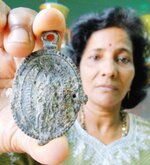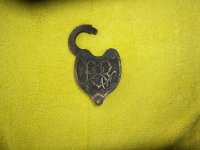The Star, wednesday February 22, 2012
Woman finds ancient artifact in baby shark
by R.S.N. MURALI
[email protected]
MALACCA: A baby shark being prepared for lunch gave a family here a big surprise - an ancient artifact believed to be dated long before the Portuguese conquest of Malacca.
Housewife Suseela Menon, from Klebang, made the priceless discovery while filleting the fish for lunch.
It is believed to be a medallion worn by the Portuguese soldiers, presumably as a divine protection, during their conquests in this part of the world in the 16th century.
One side of the medallion is a profile of a woman's head with a crown and encircled by a halo and an inscription that is unclear.
The other side is a crucifix with an engraved inscription that read ANTONII.
Checks with a local historian revealed the head engraving could be that of Queen Elizabeth, the consort of King Denis I of Portugal during his reign from 1271 to 1336.
Suseela said she immediately cleaned the medallion and preserved it in a box.
“I bought two sharks from the wet market and was taken aback upon discovering the object inside the stomach of one of the fishes,” said the 47-year-old mother-of-two at her home yesterday.
Suseela had wanted to prepare shark curry for her husband.
“Finally, my husband decided not to eat the fish as the object seems to be a religious item,” she said.
The medallion is 7.4cm long, 6cm wide and weighs 10g.
“My husband feels it is a blessing for the family to have the medallion coming to our home from beneath the sea. We will always cherish it,” said Suseela.
http://thestar.com.my/news/story.asp?file=/2012/2/22/nation/10773938&sec=nation
Woman finds ancient artifact in baby shark
by R.S.N. MURALI
[email protected]
MALACCA: A baby shark being prepared for lunch gave a family here a big surprise - an ancient artifact believed to be dated long before the Portuguese conquest of Malacca.
Housewife Suseela Menon, from Klebang, made the priceless discovery while filleting the fish for lunch.
It is believed to be a medallion worn by the Portuguese soldiers, presumably as a divine protection, during their conquests in this part of the world in the 16th century.
One side of the medallion is a profile of a woman's head with a crown and encircled by a halo and an inscription that is unclear.
The other side is a crucifix with an engraved inscription that read ANTONII.
Checks with a local historian revealed the head engraving could be that of Queen Elizabeth, the consort of King Denis I of Portugal during his reign from 1271 to 1336.
Suseela said she immediately cleaned the medallion and preserved it in a box.
“I bought two sharks from the wet market and was taken aback upon discovering the object inside the stomach of one of the fishes,” said the 47-year-old mother-of-two at her home yesterday.
Suseela had wanted to prepare shark curry for her husband.
“Finally, my husband decided not to eat the fish as the object seems to be a religious item,” she said.
The medallion is 7.4cm long, 6cm wide and weighs 10g.
“My husband feels it is a blessing for the family to have the medallion coming to our home from beneath the sea. We will always cherish it,” said Suseela.
http://thestar.com.my/news/story.asp?file=/2012/2/22/nation/10773938&sec=nation












